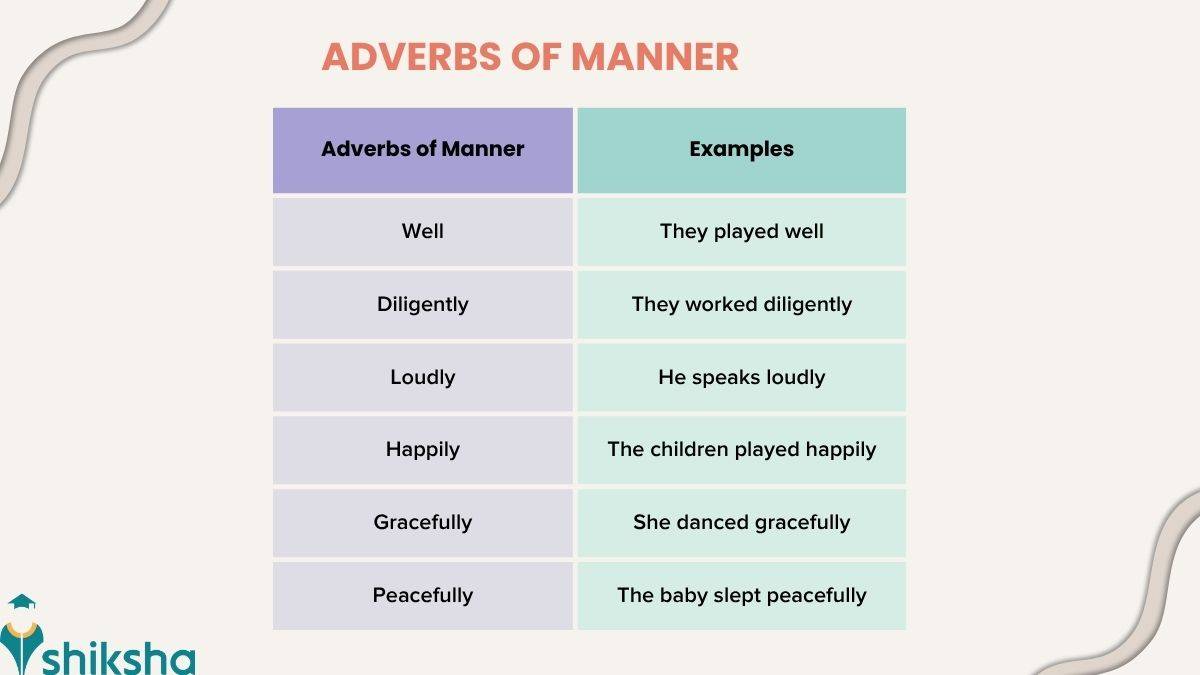
The English language depends on modifiers to enhance communication, and among these, Adverbs of Manner play an important role. These show how an action happens or is done. Basically, Adverbs of Manner modify a verb by explaining the way in which an action takes place. For instance, They danced happily at the function. If someone says this, it is natural to have a question ‘how’. After hearing or speaking a particular sentence, it is an automatic response to know how something has happened. This is where the understanding of the Adverb of Manner comes into the picture.
Words like Gracefully, Loudly, Quickly, Barely, etc. help create imagery, allowing readers and listeners to connect with the message. In this comprehensive guide to Adverb of Manner in English Grammar, we will discuss its definition, examples, practice tips, exercise questions and answers.
- What are Adverbs of Manner in English Grammar?
- Definition of Adverbs of Manner
- List of Adverbs of Manner
- How to Identify an Adverb of Manner in a Sentence?
- Placement of Adverbs of Manner in a Sentence
- Common Errors to Avoid in Adverbs of Manner
- Preparation Tips to Master Adverb of Manner
- Best Books to Understand Adverb of Manner
- Adverbs of Manner Examples
- Adverb of Manner Practice Questions with Answers
- FAQs on Adverb of Manner
What are Adverbs of Manner in English Grammar?
As the name suggests, the Adverbs of Manner are a type of Adverb. They describe how an action is performed. These words provide clarity and detail about actions. In other words, the Adverbs of Manner give the reader or listener more information about the action being done by the subject in a sentence. These can be identified by asking the question ‘how’. Typically, the Adverbs in Manner are formed by adding –ly to adjectives.
A few examples of Adverbs of Manner in sentences are given below:
- He finished his homework quickly
- They danced happily in yesterday’s party
- She spoke calmly while proving her point
- Rohan arranged the papers neatly on the desk
- They waited eagerly for the results of their competitive exams

Definition of Adverbs of Manner
According to the Macmillan Dictionary, an Adverb of Manner is “an adverb that shows how someone does something or how something happens."
For example, in the sentences ‘Drive carefully’, ‘He talks too fast’, ‘The moon shone brightly’, and ‘I accidentally deleted the file’, the Adverbs of Manner are: Carefully, Fast, Brightly, Accidentally
Definition of Adverbs of Manner according to Cambridge Dictionary
Cambridge Dictionary describes Adverbs of Manner as “the way in which something is done.”
Also Read: English Punctuation Marks
List of Adverbs of Manner
Given below is the list of Adverbs of Manner that students can use in daily conversations.
| Adverbs of Manner Examples |
||
|---|---|---|
| Gently |
Comfortably |
Passionately |
| Extravagantly |
Lovingly |
Loudly |
| Slowly |
Rapidly |
Earnestly |
| Barely |
Briefly |
Brightly |
| Accidentally |
Carefully |
Boldly |
| Cheerfully |
Superficially |
Hardly |
| Foolishly |
Politely |
Perfectly |
| Angrily |
Bravely |
Neatly |
| Well |
Wisely |
Tightly |
| Obediently |
Nervously |
Gracefully |
| Poorly |
Violently |
Repeatedly |
| Greedily |
Doubtfully |
Jovially |
Also Read: List of Vocabulary Words
How to Identify an Adverb of Manner in a Sentence?
Adverbs of Manner describe how an action takes place. They give more details about the way something happens. In a way, Adverbs of Manner modify Adjectives, Verbs, and other Adverbs and answer the question “How”. One can identify an Adverb of Manner in a sentence by following the steps given below:
- First of all, check the word that is being described
- Then, ask the question ‘how’. If that word is describing how the action is being done, then it is likely an Adverb of Manner
- Also, note that many (exceptions possible) Adverb of Manner end with –ly (Example: Softly, Quickly, Cheerfully, Wisely)
Examples:
- He spoke clearly. Know the verb here. The verb in this sentence is Spoke and Clearly is the Adverb of Manner
- The baby slept peacefully. The verb in this sentence is Slept and Peacefully is the Adverb of Manner
Also Read:
Placement of Adverbs of Manner in a Sentence
This is how one can place Adverbs of Manner in a sentence. Additionally, the following way will help students to spot Adverbs of Manner in sentences:
- Generally, the Adverb of Manner is placed after the verb in a sentence. This keeps the focus naturally on the action itself. Example: She ran quickly, He ate my tiffin greedily, The baby cried loudly
- However, the Adverb of Manner is positioned between the subject and verb, and then the emphasis shifts on the Adverb itself. Example: He gently placed the pen near the table, They carefully examined the evidence, He silently opened the door
Common Errors to Avoid in Adverbs of Manner
Some of the errors that students can make while practicing Adverbs of Manner are:
Using an Adjective instead of an Adverb
At times, one can use an Adjective to describe a Verb instead of an Adverb. In this case, ask how the action was done
- Incorrect: She behaved rude
- Correct: She behaved rudely
Redundant Use of Adverbs of Manner
Using an adverb that repeats what is already implied in the verb can be a common mistake. Some verbs express manner, so extra adverbs may not be required and can create further confusion.
- Incorrect: He shouted loudly
- Correct: He shouted
Placing the Adverb in the wrong part of the sentence
Sometimes, misplacing the adverb in the wrong part of the sentence makes it unclear. Usually, in a sentence, the Adverbs of Manner go after the verb or after the object.
- Incorrect: Reema quickly completed the test
- Correct: Reema completed the test quickly
Confusing irregular adverbs with incorrect forms
Some Adverbs of Manner do not follow the rule of –ly (at the end of the word) and may confuse the readers or listeners.
- Incorrect: She runs fastly
- Correct: She runs fast
Creating non-existent Adverbs
Adding –ly to adjectives that do not form standard adverbs can be another common error while practicing Adverbs of Manner questions
- Incorrect: She explained it friendlily
- Correct: She explained it in a friendly manner
Preparation Tips to Master Adverb of Manner
Though it is fairly easy to recognize an Adverb of Manner in a sentence, it is fairly important to know what Adverbs of Manner are and what they describe. Given below are some of the preparation tips to understand these types of adverbs and ace their questions:
- Understand what Adverbs of Manner are: It is important to have a clear understanding of what Adverbs of Manner are and how they are important in English grammar. They usually answer how something happens.
- Know the commonly used Adverbs of Manner: One can make a list of the commonly used Adverbs of Manner and then learn them
- Check the verb in a sentence: To know where the Adverb of Manner is placed in a sentence, identify the verb before. After this, ask how the action is being performed.
- Practice: Now, after learning what is Adverb of Manner is and its concept, it is important to practice the knowledge gained. For this, practice more and more questions. Students can make it a habit to identify the Adverb of Manner while reading and writing
Best Books to Understand Adverb of Manner
Adverbs of Manner Examples
Adverb of Manner Practice Questions with Answers
FAQs on Adverb of Manner
Commonly asked questions
What is the Adverb of Manner with examples?
An Adverb of Manner describes how an action is being performed. In other words, the Adverbs of Manner tell the style or way in which something happens. They usually answer the questions 'how' and modifies the verbs. A few of the examples of these types of adverbs in sentences are given below:
- He walked quickly to the stage
- She spoke kindly with the strangers
- He wrote the letter carefully
- The baby cried loudly
- She obediently listened to all the instructions of her mother
Where is the Adverb of Manner used?
An Adverb of Manner is used in a sentence to describe how an action is or is being performed. They are generally used to modify the verb and answer the questions 'how'. The common placing of an Adverb of Manner is Subject + Verb + Adverb of Manner. Examples:
- They worked silently
- He entered the room quietly to avoid waking up the baby
- They were fighting aggressively
- She danced gracefully
Do all Adverbs of Manner end in –ly?
No, not all Adverbs of Manner end in –ly. While most of them do end with –ly, many of them do not follow this condition. The Adverbs of Manner that end with –ly are:
- Quickly
- Happily
- Gracefully
- Regularly
- Loudly
- Bravely
- Slowly
- Carefully
- Neatly
- Softly
- Rapidly
Some of the Adverbs of Manner that do not end with –ly are:
Well | Late |
Right | Hard |
Early | Straight |
Far | Long |
Which books students can refer to understand the Adverbs of Manner?
Some of the books that students can purchase to understand Adverbs of Manner as a concept and practice the questions on them are:
Books | Author |
|---|---|
Adverbs | Keshab Pradhan |
4,000 Useful Adverbs in English | Manik Joshi |
Adverbs and Verbs | Maggie Rock |
Adjectives & Adverbs | Todd DeLuca |
Adverbs: Things you Should Know | Rumi Michael Leigh |
Grammar Made Easy: Adjectives and Adverbs | Merlene J Purkiss |
Dictionary of Adverbs: Vocabulary Building | Manik Joshi |
English Adverbs Exam
Student Forum
Other Topics under this Chapter
Other Class 10th English Chapters
- English Past Tense
- English Idioms
- English Punctuation
- English Analogy
- English Interjections
- English Prefixes
- English Adjectives
- English Future Continuous Tense
- English Letter Writing
- English Suffix
- English Grammar
- English One Word Substitution
- English Mood
- English Direct and Indirect Speech
- English Figures of Speech
- English Composition
- English Para Jumbles
- English Reading Comprehension
- English Sentences
- English Auxiliary and Modal Verbs
- English Formation of Words
- English Precis Writing
- English Nouns
- English Adverbs
- Conjunctions
- English Prepositions
- English Verbs
- English Paraphrasing
- English Articles
- English Subject and Predicate
- English Pronouns
- English Tenses
- English Active and Passive Voice
- English Vocabulary
- English Subject Verb Agreement
- English Phrases
- English Synonyms
- English Etymology and Roots
- English Spelling Rules
- English Parts of Speech
- English Gerunds

